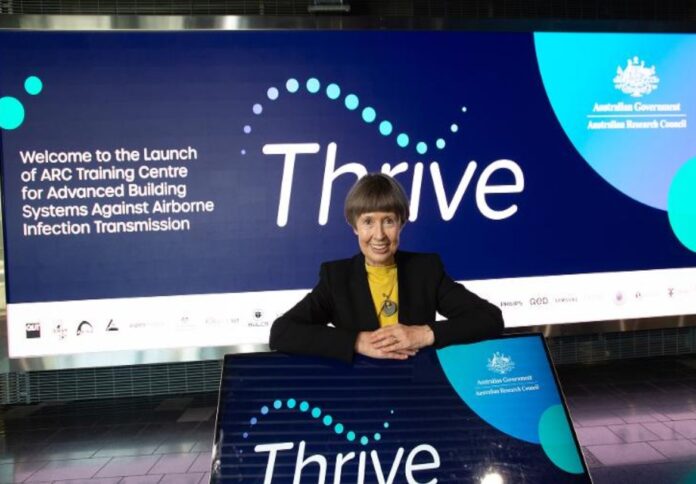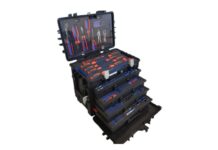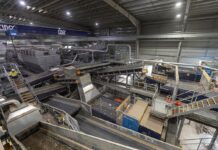
Brisbane is set to establish itself as the global epicentre for healthy buildings with the inauguration of the ARC Training Centre for Advanced Building Systems against Airborne Infection Transmission, known as Thrive.
Officially hosted by the Queensland University of Technology (QUT), the $5 million centre is poised to pioneer innovations aimed at reducing indoor airborne infection transmission by enhancing indoor air quality while ensuring comfort and energy efficiency.
At the helm of Thrive is QUT Distinguished Professor Lidia Morawska, renowned for her expertise in atmospheric, aerosol, and exposure science related to building infection transmission.
Professor Morawska emphasised the critical need for improved indoor air quality, noting, “Every drop of water we drink and every piece of food we put in our mouth is highly regulated – yet the indoor air, which we take into our lungs 12 times a minute, is not regulated at all.”
She envisions Thrive as a transformative initiative, stating, “I firmly believe the centre will be a catalyst for revolution and bring us closer to clean indoor air becoming the norm. This work has the potential to touch billions of lives in the next decade by enhancing safety from airborne transmission of infections in indoor spaces.”
According to the university, Thrive aims to address a significant gap in current building management systems.
Despite the presence of integrated sensors in complex buildings, these systems are often inadequate for ensuring clean indoor air. The centre’s mission is to develop a sophisticated system that can future-proof our built environments against potential epidemics.
Professor Morawska described this system as a “brain within a building that supports its operation, and a network of nerves and sensors that provide information and allow control of its operation to ensure clean indoor air with minimal energy consumption.”
In addition to advancing technology, Thrive will focus on developing quantitative methods for building control, creating evidence for policymaking, and offering operational guidelines.
The centre collaborates with international experts and partners from Australia, USA, Italy, China, The Netherlands, New Zealand, and Sweden. Key university collaborators include QUT, the University of Melbourne, the University of New South Wales, Jinan University, Peking University, the University of Cassino and Southern Lazio, and the University of Surrey.
Professor Jason Monty, Head of Mechanical Engineering at the University of Melbourne, underscored the necessity for change, stating, “The need for change is clear, but the political, commercial, and social will to do so has not occurred organically. In some circumstances, we need rules and regulations imposed to ensure a better quality of life and it has become clear that indoor air quality is one of those.”
Monty highlighted Thrive’s role in leveraging lessons from the COVID-19 pandemic, noting, “Thrive is a critical vehicle for Australia that will build on lessons learned from the COVID-19 pandemic to show the world how we can breathe better indoors.”
Industry partners, including Aerosol Devices, AREMA, Aspen Medical, AIRAH, BULCS Holdings, Mycotec, Philips Domestic Appliances, QED Environmental Services, Samsung, Trane Technologies, Fraunhofer WKI, Blue IoT, VASciences, Mote Ltd, and WHP Architects, are integral to Thrive’s mission.
Dr Heike Neumeister-Kemp, CEO and Principal Mycologist of Mycotec, underscored the need for clear standards on mould levels in buildings and HVAC systems.
He explained, “Our efforts are focused on lobbying for the establishment of Australian mould threshold levels, which would set clear standards for acceptable mould concentrations. By doing so, we hope to protect public health, particularly in indoor environments where people spend the majority of their time.”
Zubin Varghese, Senior Director at Trane Technologies, expressed hope for setting global standards through Thrive, saying, “Through our partnership with Thrive, we hope to help set worldwide standards on indoor air quality and identify strategies to improve standards in commercial and industrial buildings while reducing energy intensity.”
Professor Morawska’s influential work has garnered significant recognition, including her inclusion in the 2021 TIME100 list of the 100 most influential people globally and the prestigious 2023 L’Oréal-UNESCO for Women in Science Laureate for Asia and the Pacific.
Earlier this year, she was elected as a member of the American Academy of Arts and Sciences.
The ARC Training Centre for Advanced Building Systems Against Airborne Infection Transmission (Thrive) is funded by the Australian Government and industry partners through the Australian Research Council Industrial Transformation Training Centre Program.




















